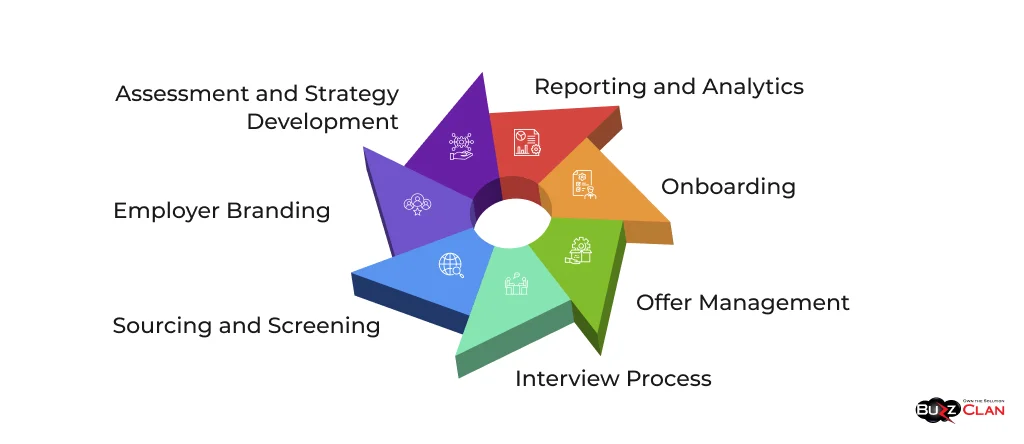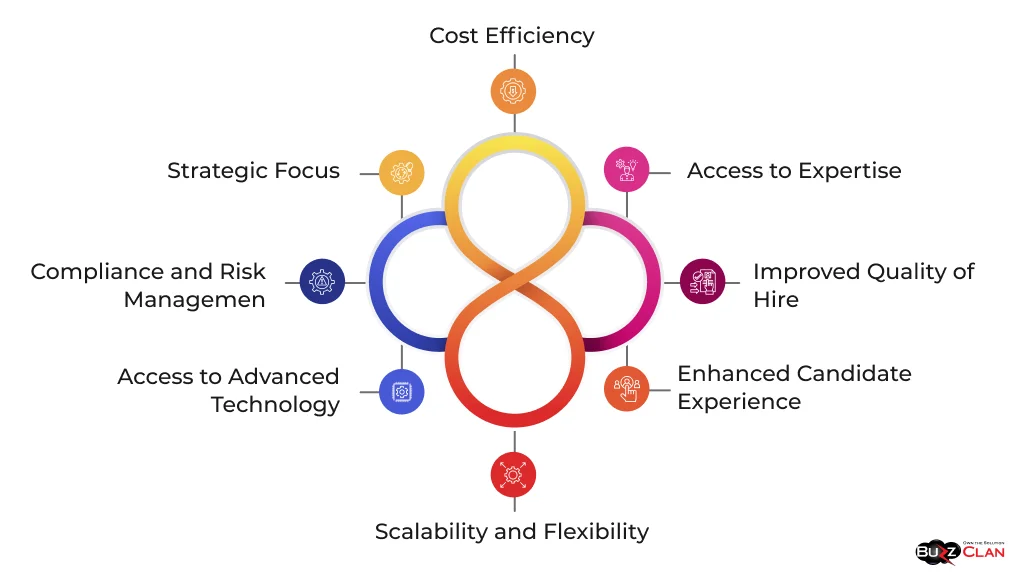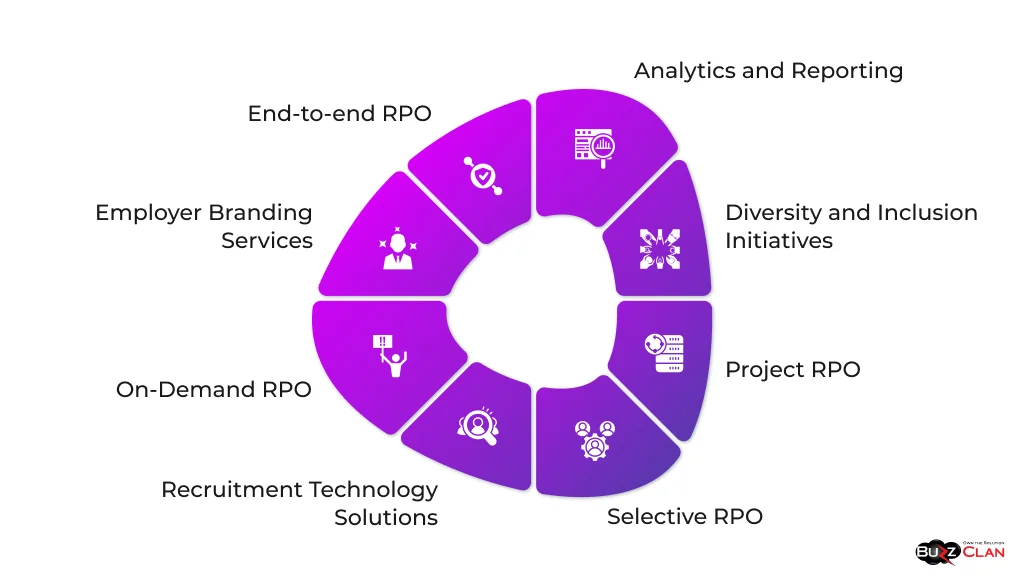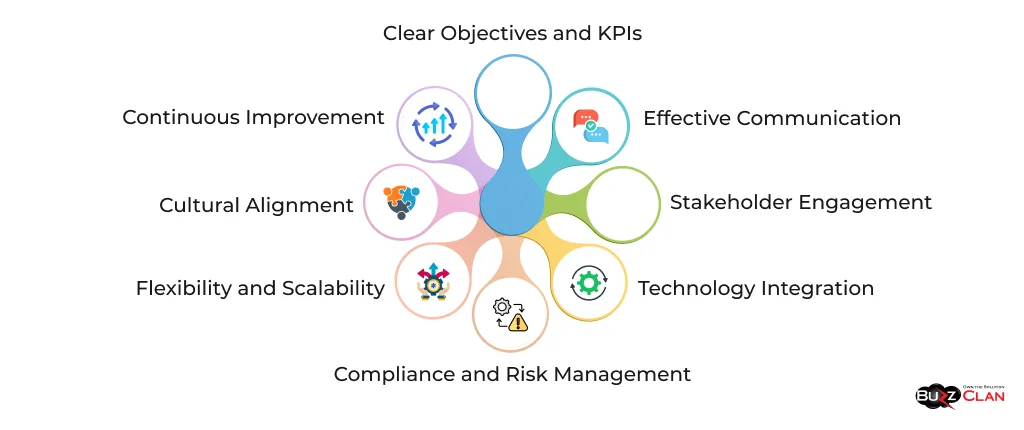Mastering RPO: A Comprehensive Guide to Transforming Your Recruitment Strategy
Ety Garg
Jul 25, 2024
Introduction
In today’s fiercely competitive business landscape, the ability to attract and retain top talent has become a critical factor in organizational success. As companies strive to stay ahead in the war for talent, many are turning to innovative recruitment strategies to gain an edge. One such strategy that has gained significant traction in recent years is Recruitment Process Outsourcing (RPO).
This comprehensive guide aims to demystify RPO, providing a deep dive into its definition, benefits, industry insights, and best practices. Whether you’re an HR professional looking to optimize your recruitment processes or a business leader exploring ways to enhance your talent acquisition strategy, this piece will equip you with the knowledge to make informed decisions about RPO.
Throughout this article, we’ll explore the intricacies of RPO, from its fundamental concepts to the latest trends shaping its future. We’ll delve into the various RPO models and approaches, examine real-world case studies, and discuss best practices for successful implementation. By the end of this guide, you’ll have a thorough understanding of how RPO can transform your recruitment strategy and drive business success.
What is Recruitment Process Outsourcing (RPO)?
Recruitment Process Outsourcing (RPO) is a form of business process outsourcing where an employer transfers all or part of its recruitment processes to an external service provider. The RPO provider extends the company’s HR department, providing a more efficient, effective, and scalable recruitment function.
RPO goes beyond traditional recruitment outsourcing by assuming ownership of the design and management of the recruitment process and the responsibility for results. This means that the RPO provider doesn’t just fill open positions but works strategically to improve the entire recruitment function, from employer branding to onboarding.
The significance of RPO in modern recruitment strategies lies in its ability to provide organizations with a competitive edge in talent acquisition. By leveraging specialized RPO providers’ expertise, technology, and resources, companies can improve hiring quality, reduce time-to-hire, and optimize recruitment costs.
How Does Recruitment Process Outsourcing Work?

RPO is a comprehensive approach to recruitment that typically involves the following steps:
- Assessment and Strategy Development: The RPO provider begins by thoroughly assessing the client’s current recruitment processes, needs, and challenges. Based on this assessment, they develop a tailored recruitment strategy aligned with the client’s business objectives.
- Employer Branding: The RPO provider enhances the client’s employer brand to attract top talent. This may involve revamping job descriptions, improving the company’s online presence, and developing compelling recruitment marketing materials.
- Sourcing and Screening: The RPO provider uses advanced sourcing techniques and technologies to identify and engage potential candidates. They then screen these candidates using predetermined criteria to ensure a good fit.
- Interview Process: The RPO provider manages the interview process, coordinating with hiring managers and candidates to schedule interviews, conduct initial screenings, and provide feedback.
- Offer Management: Once a suitable candidate is identified, the RPO provider handles the offer process, including negotiation and paperwork.
- Onboarding: Many RPO providers also assist with onboarding, ensuring a smooth transition for new hires.
- Reporting and Analytics: Throughout the process, the RPO provider collects and analyzes data to provide insights and continually improve the recruitment process.
Service Level Agreements (SLAs) play a crucial role in RPO partnerships. These agreements define the scope of services, performance metrics, and expectations for both parties. Common SLAs in RPO agreements include time-to-fill, quality of hire, candidate satisfaction, and cost-per-hire. Well-defined SLAs ensure alignment between the RPO provider and the client, driving accountability and continuous improvement.
Benefits of Recruitment Process Outsourcing

RPO offers numerous benefits to organizations, making it an attractive option for companies looking to optimize their recruitment function:
- Cost Efficiency: RPO can lead to significant cost savings by reducing the need for internal recruitment staff, minimizing agency fees, and optimizing recruitment advertising spend. The scalable nature of RPO also means that companies only pay for the services they need, avoiding the costs associated with maintaining a large in-house recruitment team during periods of low hiring activity.
- Access to Expertise: RPO providers specialize in recruitment, bringing their clients knowledge, best practices, and industry insights. This expertise can be particularly valuable in niche or highly competitive industries where talent is scarce.
- Scalability and Flexibility: One key advantage of RPO is its ability to scale up or down quickly based on hiring needs. This flexibility allows organizations to manage hiring spikes efficiently without constantly adjusting the size of their internal recruitment team.
- Improved Quality of Hire: RPO providers use advanced sourcing techniques, assessment tools, and data-driven approaches to identify and attract top talent. This often results in better quality hires who are more likely to succeed and stay with the organization long-term.
- Enhanced Candidate Experience: RPO providers focus on creating a positive candidate experience, which can improve an organization’s employer brand and increase the likelihood of attracting top talent.
- Access to Advanced Technology: RPO providers invest in the latest recruitment technologies, including AI-powered sourcing tools, applicant tracking systems, and data analytics platforms. Clients benefit from these technologies without having to make significant investments themselves.
- Compliance and Risk Management: RPO providers stay up-to-date with employment laws and regulations, helping to ensure compliance and reduce legal risks associated with recruitment.
- Strategic Focus: By outsourcing the operational aspects of recruitment, HR teams can focus on more strategic initiatives that drive business value.
RPO Solutions and Services

RPO providers offer a range of solutions and services tailored to meet the diverse needs of their clients:
- End-to-end RPO: This comprehensive solution covers the entire recruitment process, from workforce planning to onboarding. It’s ideal for organizations looking to completely transform their recruitment function.
- Project RPO: Designed for specific hiring initiatives or periods of high-volume recruitment, project RPO provides temporary support to manage hiring spikes efficiently.
- On-Demand RPO: This flexible model allows organizations to access RPO services as needed, scaling up or down based on current hiring demands.
- Selective RPO: In this model, organizations outsource specific components of their recruitment process, such as sourcing or screening, while retaining control over other aspects.
- Recruitment Technology Solutions: Many RPO providers offer technology solutions that can be integrated with a client’s existing systems to enhance recruitment efficiency.
- Employer Branding Services: RPO providers can help develop and enhance an organization’s employer brand to attract top talent.
- Diversity and Inclusion Initiatives: Specialized RPO services focused on improving diversity and inclusion in hiring.
- Analytics and Reporting: Advanced analytics and reporting services to provide insights into recruitment performance and areas for improvement.
The customization and flexibility of RPO solutions allow organizations to choose the services that best align with their specific needs and objectives.
Industry Overview of Recruitment Process Outsourcing
The RPO industry has experienced significant growth in recent years, driven by the increasing recognition of the strategic importance of talent acquisition. According to recent market research, the global RPO market is expected to reach $20.8 billion by 2027, growing at a CAGR of 18.5% from 2020 to 2027.
Key trends shaping the RPO industry include:
- Increased Focus on Technology: RPO providers increasingly leverage AI, machine learning, and data analytics to enhance recruitment efficiency and effectiveness.
- Emphasis on Candidate Experience: As talent competition intensifies, RPO providers emphasize creating positive candidate experiences to attract top talent.
- Rise of Total Talent Acquisition: There’s a growing trend towards integrating permanent and contingent workforce solutions under a single RPO model.
- Global Expansion: Many RPO providers are expanding their global footprint to support multinational clients and tap into new markets.
- Focus on Diversity and Inclusion: RPO providers are developing specialized solutions to help clients improve diversity and inclusion in their hiring processes.
Some of the key players in the RPO industry include:
- Cielo
- Korn Ferry
- BuzzClan
- Alexander Mann Solutions
- PeopleScout
- Randstad Sourceright
- Hudson RPO
- Manpower Group
- Allegis Global Solutions
These providers offer a range of RPO solutions and have established themselves as leaders in the industry through their innovative approaches, global reach, and proven track records of success.
RPO Models and Approaches
RPO providers offer various models and approaches to cater to different organizational needs:
End-to-end RPO: This comprehensive model involves outsourcing the entire recruitment process to the RPO provider. The provider is responsible for all recruitment activities, from job requisition to onboarding. This model is ideal for organizations looking to transform their recruitment function completely.
Advantages:
- Consistent and streamlined recruitment process
- Significant cost savings through economies of scale
- Access to the full range of RPO provider’s expertise and resources
Project RPO: This model is designed for specific hiring initiatives or periods of high-volume recruitment. It provides temporary support to manage hiring spikes efficiently without the long-term commitment of a full RPO engagement.
Advantages:
- Flexibility to handle short-term hiring needs
- Access to specialized expertise for specific projects
- Cost-effective solution for managing hiring fluctuations
Selective RPO: In this model, organizations outsource specific components of their recruitment process while retaining control over others. For example, a company might outsource sourcing and screening but keep interviewing and selection in-house.
Advantages:
- Allows organizations to leverage RPO for specific areas of expertise
- Provides flexibility to retain control over critical aspects of recruitment
- Can be a stepping stone to full RPO implementation
On-Demand RPO: This flexible model allows organizations to access RPO services as needed, scaling up or down based on current hiring demands.
Advantages:
- Highly flexible and scalable
- The pay-as-you-go model can be cost-effective for organizations with fluctuating hiring needs
- Allows organizations to test RPO services before committing to a full engagement
Hybrid RPO: This model combines elements of different RPO approaches to create a customized solution that meets an organization’s specific needs.
Advantages:
- Tailored to the unique needs and culture of the organization
- Balances the benefits of outsourcing with the desire for internal control
- Can evolve as the organization’s needs change
The choice of the RPO model depends on various factors, including the organization’s size, hiring volume, recruitment challenges, and strategic objectives. Many organizations start with a project or selective RPO approach and gradually move towards a more comprehensive model as they experience the benefits of RPO.
Challenges and Solutions in Recruitment Process Outsourcing
While RPO offers numerous benefits, organizations may face challenges during implementation and ongoing management. Here are some common challenges and strategies to address them:
| Organizations | Challenge | Solution |
|---|---|---|
| Cultural Fit | Ensuring the RPO provider understands and aligns with the organization's culture and values. | Conduct thorough due diligence when selecting an RPO provider, including assessing cultural alignment. Involve key stakeholders in the selection process and consider a pilot program before full implementation. |
| Resistance to Change | Internal resistance from HR teams or hiring managers who may feel threatened by the introduction of RPO. | Communicate the benefits of RPO, involve internal teams in the process, and provide training on how to work effectively with the RPO provider. |
| Integration with Existing Systems | Integrating RPO processes and technologies with existing HR and IT systems. | Choose an RPO provider with experience in system integration and invest in proper planning and testing before full implementation. |
| Data Security and Privacy | Ensuring the security and privacy of sensitive candidate and employee data. | Select an RPO provider with robust data security measures and clear policies on data handling. Regularly audit data security practices. |
| Measuring ROI | Accurately measure the return on investment for RPO implementation. | Establish clear KPIs and metrics at the outset of the RPO engagement. Regularly review and refine these metrics to accurately reflect the value delivered. |
| Maintaining Quality | Ensuring consistent quality of hires across different roles and locations. | Develop clear quality standards and metrics. Regularly review performance data and candidate feedback to identify areas for improvement. |
| Scalability | Ensuring the RPO solution can scale effectively to meet changing hiring needs. | Choose an RPO provider with proven scalability and flexibility. Regularly review and adjust the RPO agreement to ensure it continues to meet evolving needs. |
By anticipating these challenges and implementing proactive solutions, organizations can maximize the benefits of their RPO engagement and drive long-term success in their recruitment efforts.
Case Studies and Real-World Examples
To illustrate the impact of RPO in practice, let’s examine two case studies:
Case Study 1: Global Technology Company
A multinational technology company struggled with long time-to-fill rates and inconsistent hiring quality across its global operations. It implemented an end-to-end RPO solution with a leading provider to address these issues.
Results:
- 30% reduction in time-to-fill across all positions
- 25% improvement in hiring manager satisfaction
- 20% reduction in overall recruitment costs
- Improved diversity in hiring, with a 15% increase in diverse candidates hired
Key Lessons:
- Importance of global consistency in recruitment processes
- Value of data-driven decision-making in recruitment
- Impact of employer branding on attracting top talent
Case Study 2: Healthcare Provider
A regional healthcare provider faced challenges recruiting specialized medical professionals in a competitive market. They implemented a selective RPO solution focusing on hard-to-fill roles to address this.
Results:
- 40% reduction in time-to-fill for specialized roles
- 35% decrease in agency spend
- Improved candidate quality, with a 20% increase in first-year retention rates
- Enhanced employer brand, leading to a 25% increase in applications for key roles
Key Lessons:
- Effectiveness of specialized sourcing strategies for niche roles
- Importance of candidate experience in attracting top talent
- Value of market insights provided by RPO experts
These case studies demonstrate the tangible benefits that RPO can deliver across different industries and organizational contexts.
Best Practices for Implementing Recruitment Process Outsourcing

To maximize the benefits of RPO, organizations should follow these best practices:
Clear Objectives and KPIs:
- Define clear objectives for the RPO engagement aligned with overall business goals
- Establish specific, measurable KPIs to track performance and ROI
- Regularly review and adjust KPIs as needed
Effective Communication:
- Develop a comprehensive communication plan to inform all stakeholders about the RPO implementation
- Ensure ongoing, transparent communication between the organization and the RPO provider
- Establish clear channels for feedback and issue resolution
Stakeholder Engagement:
- Involve key stakeholders, including HR teams and hiring managers, in the RPO selection and implementation process
- Provide training and support to help internal teams work effectively with the RPO provider
- Regularly seek feedback from stakeholders to identify areas for improvement
Technology Integration:
- Ensure seamless integration between the RPO provider’s technology and existing HR and IT systems
- Leverage advanced recruitment technologies to enhance efficiency and effectiveness
- Provide adequate training on new technologies to all users
Continuous Improvement:
- Implement regular performance reviews and audits of the RPO process
- Use data and analytics to identify trends and areas for improvement
- Encourage innovation and the adoption of new recruitment strategies and technologies
Flexibility and Scalability:
- Choose an RPO solution that can scale and adapt to changing business needs
- Regularly review and adjust the RPO agreement to ensure it continues to meet organizational requirements
- Be open to evolving the RPO model as the organization’s needs change
Cultural Alignment:
- Ensure the RPO provider understands and aligns with the organization’s culture and values
- Involve the RPO provider in employer branding initiatives
- Encourage the RPO team to become true brand ambassadors for the organization
Compliance and Risk Management:
- Ensure the RPO provider has robust compliance processes in place
- Regularly audit recruitment practices to ensure adherence to legal and ethical standards
- Stay informed about changes in employment laws and regulations that may impact recruitment practices
By following these best practices, organizations can ensure a successful RPO implementation that delivers long-term value and supports their talent acquisition strategy.
Future Trends in Recruitment Process Outsourcing
As the RPO industry continues to evolve, several trends are shaping its future:
- AI and Automation:
Artificial Intelligence and automation are revolutionizing recruitment processes. AI-powered tools are used for resume screening, candidate matching, and initial interviews. This trend is expected to accelerate, with RPO providers leveraging AI to enhance efficiency and improve the quality of hires.
- Data-Driven Recruitment:
The use of big data and analytics in recruitment is becoming increasingly sophisticated. RPO providers use data to predict hiring needs, identify the most effective sourcing channels, and predict candidate success. This data-driven approach allows for more strategic and effective recruitment decisions.
- Focus on Candidate Experience:
As competition for top talent intensifies, there’s a growing emphasis on creating exceptional candidate experiences. RPO providers are investing in technologies and processes to enhance every touchpoint of the candidate journey, from initial engagement to onboarding.
- Emphasis on Diversity and Inclusion:
Diversity and inclusion have become critical priorities for many organizations. RPO providers are developing specialized solutions to help clients improve diversity in their hiring processes, including AI-powered tools to reduce bias and targeted sourcing strategies to reach diverse candidate pools.
- Integration of Permanent and Contingent Workforce Solutions:
There’s a growing trend towards total talent acquisition, where RPO providers offer integrated solutions for both permanent and contingent workforce needs. This holistic approach allows for more strategic workforce planning and management.
- Employer Branding and Recruitment Marketing:
RPO providers are increasingly taking on a strategic role in developing and enhancing their clients’ employer brands. This includes creating compelling recruitment marketing content, managing a social media presence, and developing targeted campaigns to attract top talent.
- Virtual and Remote Recruitment:
The COVID-19 pandemic has accelerated the adoption of virtual recruitment practices. RPO providers are developing innovative solutions for virtual interviewing, remote onboarding, and managing distributed teams. This trend is likely to continue even as in-person interactions resume.
- Predictive Analytics for Talent Acquisition:
Advanced predictive analytics forecast hiring needs, identify potential skill gaps and predict candidate success and retention. This allows for more proactive and strategic recruitment planning.
- Blockchain in Recruitment:
Blockchain technology is being explored for its potential to streamline background checks, verify credentials, and enhance data security in recruitment processes. While still in its early stages, this technology could significantly impact the future of RPO.
- Personalization at Scale:
RPO providers are leveraging technology to deliver personalized candidate experiences at scale. This includes tailored job recommendations, customized communication, and personalized onboarding experiences.
As these trends continue to shape the RPO landscape, organizations and RPO providers will need to stay agile and adapt their strategies to leverage new technologies and meet evolving talent acquisition challenges.
Conclusion
Recruitment Process Outsourcing has emerged as a powerful strategy for organizations looking to optimize their talent acquisition processes. By partnering with specialized RPO providers, companies can access expert knowledge, advanced technologies, and scalable solutions that drive efficiency, quality, and strategic value in their recruitment efforts.
Throughout this comprehensive guide, we’ve explored the definition and workings of RPO, its numerous benefits, the various models and approaches available, and best practices for successful implementation. We’ve also examined real-world case studies demonstrating RPO’s tangible impact on an organization’s recruitment outcomes.
As the business landscape continues to evolve, with increasing competition for talent and rapid technological advancements, the role of RPO is likely to become even more critical. The future of RPO promises exciting developments in areas such as AI-driven recruitment, data analytics, and personalized candidate experiences.
For organizations considering RPO, it’s essential to approach the decision strategically. This means clearly defining objectives, choosing the right RPO model, selecting a provider that aligns with your organizational culture and values, and implementing best practices for ongoing management and optimization.
By leveraging the power of RPO, organizations can transform their recruitment function from a tactical process into a strategic driver of business success. Effective recruitment can provide a significant competitive advantage in an era where talent is often the key differentiator between companies.
As you consider your organization’s recruitment strategies, we encourage you to explore how RPO could support your talent acquisition goals. Whether you’re looking to improve hiring quality, reduce time-to-fill, enhance your employer brand, or simply bring more strategic focus to your recruitment efforts, RPO offers a flexible and powerful solution.
FAQs

Get In Touch
